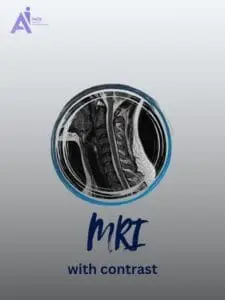What Is an Online MRI Consultation?
An online MRI consultation connects you directly with a board-certified radiologist via secure video technology to discuss your MRI results. Instead of waiting for your primary doctor to interpret and relay my findings, we can talk face-to-face about what your scan shows, what it means for your health, and what steps come next.
Here’s what makes this different from traditional radiology: In the old model, I’d write a detailed report for your doctor, who would then explain it to you days or weeks later. With online consultations, I’m explaining your results directly to you, answering your questions in real-time, and helping you understand exactly what we’re seeing on your images.
In my practice, I’ve found that patients who participate in online MRI consultations feel more informed and less anxious about their results. There’s something powerful about seeing your own images while talking to the radiologist who read them.

Before Your Online Consultation: Essential Preparation Steps
The success of your online consultation starts well before we meet virtually. Here’s my preparation checklist that I share with every patient:
Technology Setup (Test This 24 Hours Early)
Your consultation will happen through a HIPAA-compliant video platform – never through regular video calling apps like Zoom or Skype. You’ll receive secure login credentials via email about an hour before your appointment.
Test your internet connection and camera beforehand. I recommend having at least one backup option: if your computer isn’t working well, have your tablet or smartphone ready. Nothing’s more frustrating than technical difficulties when you’re eager to discuss important health information.
Make sure you’re in a quiet, private space with good lighting. I need to see you clearly, and you’ll want privacy for our medical discussion.
Gather Your Medical Information
Have a complete list of your current medications, including over-the-counter supplements. Sometimes what we see on an MRI can be related to medications you’re taking.
Prepare a written list of your symptoms, including when they started, what makes them better or worse, and any treatments you’ve already tried. I find that patients often forget important details when they’re nervous, so having notes helps enormously.
If you’ve had previous imaging studies, try to gather those reports. Understanding how your condition has changed over time gives me crucial context for interpreting your current scan.
Questions to Ask
Write down your questions beforehand. I always reserve time at the end of our consultation for questions, but having them written down ensures you won’t forget anything important. Common questions include:
- What exactly did you find on my MRI?
- How serious is this finding?
- What are my treatment options?
- Do I need additional testing?
- What should I expect going forward?
During the Consultation: What Actually Happens
When we connect for your online MRI consultation, I’ll start by verifying your identity and making sure our connection is secure and clear. This isn’t just protocol – it’s your protected health information we’re discussing.
The Image Review Process
I’ll share your MRI images on screen, walking you through exactly what I’m seeing. This is where online consultations really shine. Instead of trying to describe complex anatomy over the phone, I can point directly to areas of concern or normalcy on your actual scan.
I’ll start with normal anatomy, showing you what healthy tissue looks like on your particular type of MRI. Then I’ll point out any findings – whether they’re significant abnormalities, minor age-related changes, or completely normal variants that might have worried you.
In my experience, patients understand their conditions much better when they can see their own images. I’ve had countless patients tell me, “Now I finally understand what’s wrong with my back,” or “I can see why my doctor recommended surgery.”
Medical Discussion
We’ll discuss what your findings mean in the context of your symptoms and medical history. I’ll explain any medical terminology in plain language and make sure you understand the significance of what we’re seeing.
This is also when I’ll discuss treatment recommendations, whether you need additional testing, and what to expect going forward. Unlike a traditional radiology report that uses technical language for other physicians, our conversation is tailored specifically for you.
Documentation
After our consultation, you’ll receive a summary of our discussion along with your formal radiology report. This gives you something to reference later and share with your other healthcare providers.
Common Concerns Patients Have
“Will the Doctor Take Me Seriously in a Virtual Setting?”
This is one of the most common worries I hear, and I understand it completely. Let me assure you: an online MRI consultation is every bit as thorough and professional as an in-person visit. In fact, because we’re specifically focused on reviewing your imaging, I often spend more concentrated time with online consultation patients than I would in a traditional setting.
“What if I Don’t Understand the Technology?”
I work with patients of all tech comfort levels, from teenagers to grandparents in their nineties. The platforms we use are designed to be simple. If you can make a phone call, you can handle an online consultation. My staff always does a technology check with new patients, and I’m always patient with any technical hiccups during our session.
“Can You Really See Everything You Need to See Online?”
Absolutely. The image quality on my end is identical to what I see in the hospital. Your MRI data is transmitted digitally with no loss of quality. In many ways, online review is actually superior because I can manipulate the images more easily, zoom in on specific areas, and show you multiple views simultaneously.
“What if You Find Something Serious?”
This is perhaps the most important concern. If I discover findings that require immediate attention, I’ll explain exactly what needs to happen next. I have protocols in place to ensure urgent findings are communicated immediately to your referring physician. You’ll never be left wondering what to do with concerning results.
Making the Most of Your Online Consultation
Be Honest About Your Symptoms
Sometimes patients downplay their symptoms because they’re worried about what we might find. Please don’t do this. The more accurate information you give me, the better I can correlate your imaging findings with your clinical picture.
Ask About Prevention
If your MRI shows early changes or risk factors, ask about prevention strategies. Many conditions we see on imaging can be slowed or prevented from worsening with the right approach.
Understand Your Role
While I’ll interpret your MRI and explain the findings, remember that I’m usually not the doctor who will be managing your ongoing care. Make sure you understand what follow-up is needed and with which specialists.

What Happens After Your Consultation
You’ll leave our online MRI consultation with a clear understanding of your results and a specific plan for next steps. Whether that’s physical therapy, medication, additional testing, or simply reassurance that everything looks normal, you’ll know exactly where you stand.
Many of my patients tell me that their anxiety decreases significantly after our consultation, even when we’ve found something that needs treatment. There’s tremendous value in understanding your condition rather than wondering and worrying.
I’ll coordinate with your referring physician to ensure continuity of care, and you’re always welcome to reach out if you have additional questions after reviewing the materials I provide.
When to Consider an Online MRI Consultation
Online MRI consultations are ideal when you want direct access to the radiologist who interpreted your scan, when you need a MRI second opinion, or when traditional scheduling doesn’t work with your busy life. They’re particularly valuable for complex findings that benefit from detailed explanation or when you’re considering treatment options that depend on specific imaging findings.
However, if you’re experiencing a medical emergency or acute symptoms that require immediate evaluation, don’t wait for an online consultation. Seek immediate medical care.
Your health deserves expert attention, and online MRI consultations provide you with detailed, personalized information about your imaging results, eliminating the barriers of traditional healthcare scheduling. The technology that once seemed like science fiction has become a powerful tool for patient education and care.
Ready to take control of your health information? An online MRI consultation puts you directly in touch with the expert who knows your scan better than anyone else, because I’m the one who reads it.




